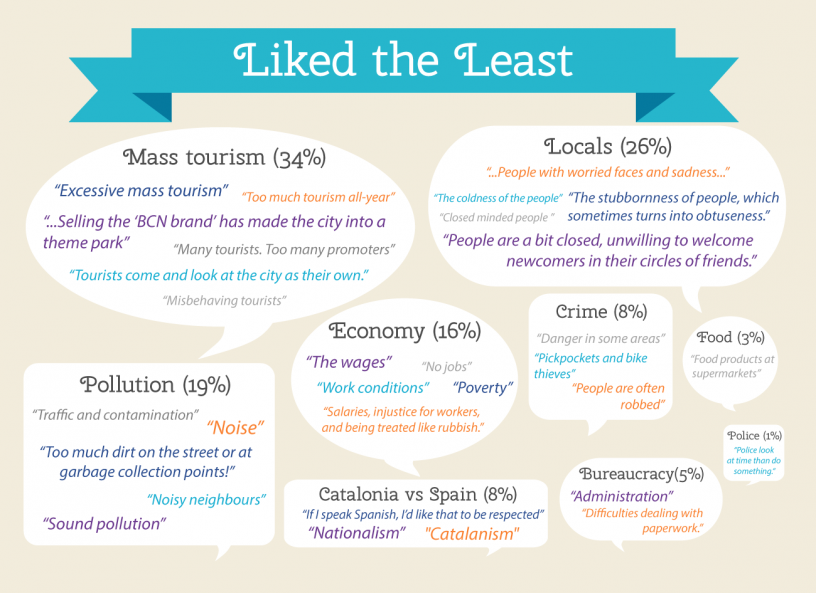One Third Of Expats Criticize Levels Mass Tourism In Barcelona
At OK Apartment Barcelona the holiday apartments and monthly rentals agency, we made a survey of 850 expats that have lived in Barcelona for at least 3 months.
Participants responded to the question “What do you least like about the city?” in an open-ended question and in the upcoming analysis we have summarised these answers into 9 negative factors.
The biggest named defect in Barcelona amongst expats was its mass tourism. Over 1 in 3 respondents (34%) that live here affirmed that the city has a level of mass tourism that they dislike. Other relevant negative factors that appeared include local character (26%), pollution (19%), and theeconomy (16%).
Analysing this question we arrived in a natural way to the problem of the amplification of tourism. In this article we we define the problem of Barcelona’s version of mass tourism and outline the solutions being taken by local authorities by which we propose a new motion of action.
We include an infographic as a graphical summary as well as video interviews with expats. Do you agree with the respondents of this survey? You can leave a comment on this page.
The survey sample
The survey includes 850 people of 26 nationalities, with the requirement that they have been living in Barcelona for at least 3 months. The survey includes a total of 20 questions and in the next upcoming press releases we will analyse more questions including the reception from the Catalans, what expats like most about Barcelona, opinion on the referendum on self-determination, and interest and knowledge on the local Catalan language.
Open-ended question. Open-ended answers.
Respondents commented everything they dislike about Barcelona in an open text in which they mentioned one, two, or three negative aspects. No-one mentioned more than three and the average was 2.1. To give more value to the results of this question we avoided giving a closed-list of predetermined answers.
We categorized the answers and 99% of them can be summed up within 9 negative factors about the city which are numbered throughout this study.
Answers such as “I like everything” and “I don’t dislike anything” where not counted. There were a total of 646 valid answers. According to the country of origin, the number of valid answers were: Italy (242), France (164), Germany (72), Russia (50), Denmark (36), Argentina (28), and Poland (22). We did not take count nationalities for which there were no more than 20 answers.
What Expats like the least
What do you like least about Barcelona?
Largest factor (34%) – Barcelona’s Mass tourism in 3 steps
The negative factor by far mentioned the most was mass tourism. Just over one in three expats(34%) affirm that Barcelona has alevel of mass tourism that they do not like.
A lot has been written on mass tourism in Barcelona, but this is the first time it has been done soley from the perspective of expats many of whom started off their time in the city as “outsiders”, allowing them perhaps to form a more objective view on Barcelona’s weak points.
The infographics demonstrate that amongst the surveyed nationalities it was Polish (54%) and German (38%) expats that had the highest percentage that disliked mass tourism. The nationalities that were bothered the least by mass tourism were Russians (26%) and Argentinians (25%).
A selection of some of the comments were:
“Excessive mass tourism” / “Too much tourism all-year / “Selling the “BCN brand” has made the city into a theme park” / “Many tourists. Too many promotors.” / “Tourists come and look at the city as their own”, / “Misbehaving tourists”
The problem was considered in 3 steps: The data, the problem, and the solutions.
1. The data
Barcelona is the 4th most visited city in Europe after London, Paris, and Rome, despite being smaller.
There are less than 1.6 million habitants and is now receiving more than 8 million tourists each year. The growth is noticeable; 1.7 million tourists in 1990, 3.1 million in 2000, 6.3 million in 2006, and over 8 million in 2013. It has the leading cruise port in the Mediterranean. However, it has come to depend on the wealth produced by tourism, which accounts for 20% of its Gross Domestic Product (GDP).
2. The problem
The main problem is the mass of tourism and the effect it has on the quality of life for citizens. Growth in tourism has transformed certain parts of the city such as Barceloneta, Las Ramblas, the Sagrada Familia, and Park Güell areas.
Tension between neighbours and mass tourism has resulted from the following:
- Many local neighbourhood shops have shut down and been replaced with souvenir stores, bars, and restaurants.
- An increase in housing prices owing to homeowners renting out at a higher rate to tourists, foreign investment eating into housing stock, and inflated asking prices accounting for lack of knowledge of the local market amongst immigrating buyers.
- Exasperation caused by noise, foot traffic, and behaviour of some tourists.
- The consequent exodus of locals.
3. A solution
For some time, local authorities have been taking measures to mitigate the negative effects of mass tourism. Current policies however, are mainly aimed at the regulation over the supply of accommodation.
In 2005 licenses were suspended for renting tourist apartments in the area of the old city and in July 2015 all accommodation licenses were suspended prior to a plan to create a regulator for the sector.
On 23 February 2016, an outline for such as regulator was presented called Pla Especial Urbanístic d’Allotjaments Turístics (PEUAT) or Special Urban Tourist Accommodation Plan. This regulator will control all kinds of accommodation including hostels, hotels, Bed&Breakfasts, and apartments. 73 neighbourhoods in Barcelona exceed 6.4 tourist beds for every 100 habitants.
This plan is a basic part of the solution of Barcelona’s tourism model, it highlights two objectives:
- It is intends to reduce the supply of tourist accommodation in the city center, maintain levels in the surrounding areas, and increase it in the rest of the city.
- New tourist accommodation may not replace any home that has had an effective residential use before the precautionary suspension of licenses last July, 2015.
Through accommodation, the council wants to encourage equitable sharing of tourism’s benefits throughout all parts of the city while decongesting areas under a larger environmental and social pressure.
More solutions?
Many visitors are interested in experience an un-touristic version of Barcelona, but don’t due to lack of awareness. Accommodation in further parts of the city isn’t enough to get visitors to detour to these areas and outside the city.
New York, for example carried our a campaign called Neighborhood x Neighborhood. In the most visited American city, in 2013 they designed a campaign to encourage visitors to discover the offering in 5 neighbourhoods beyond Manhattan. Thanks to this they spread visitors throughout these areas, which have benefited from the increased economic activity.
Another exemplar campaign from New York is more recent one called “Unlock NYC”, which adds a focus of not just on spreading tourists across space, but time also, by inviting tourists to visit during off-peak seasons. Something that hasn’t yet been done in Barcelona, encouraging tourists to see the benefits of visiting in the winter despite the differences in weather.
Along the lines of Neighbourhood x Neighbourhood, Barcelona has a similar but isolated initiative in the Horta-Guinardó district –10 routes related with history, beautiful views, and culture of the area. But as is plain to see, it’s only available in Catalan, meaning it is practically inaccessible to tourists. A political will is needed to universalise initiatives like these and promote the activities in areas beyond the usual scope of tourism.
Second Factor (26%): The closed-off character of Catalans
26% of the mentions comment on the cold and closed-off character of Barcelona locals – principally Catalans:
“Closed-minded people” / “People with worried faces and sadness…” / “The coldness of people” / “The stubborness of people, which sometimes turns into obtuseness” / “People are a bit closed, unwilling to welcome newcomers in their circles of friends”
Despite this over 50% consider the reception from Catalans to be excellent or good. The look at the reception from Catalans and local character in more detail in another article. Those that comment most are Argentinians (45%) and Russians (29%)and least are Germans (17%) and Polish (17%). It’s unsurprising almost half of Argentines – with a stereotypically fiery Latin character – feel the coldness of the locals the most…
Third factor (19%): Pollution
The third most commented negative factor was pollution. This was mentioned by 19% of the respondents, who broke it down into three aspects. By order of importance: Noise pollution, dirty streets, and air pollution:
“Traffic and contamination” / “Noise” / “Noisy neighbours” / “Sound pollution” / “Too much dirt on the street or at garbage collection points!”
Those that comment on this factor most are the German (25%) and French (23%) respondents and those that comment least were Polish (9%) and Russian (6%).
Fourth factor (16%): Economy
Economic problems only appeared mentioned by 16% of respondents, commented mostly by Polish (23%) and Russians (22%)
and least by Germans (13%) and Argentinians (11%)
“Work conditions”, “No jobs”, “Poverty”, “Salaries, injustice for workers, and being treated like rubbish”, “The wages”
According to the latest study from the Centre of Sociological Investigations in Spain, people who live in Spain worry mostly about unemployment (78.8%), corruption (43.7%) and the economy (25%).
Minor Factors (5-8%) and Scarce factors (<5%)
Minor negative aspects include:
- Factor 5: Crime (8%)
- Factor 6: Catalonia Vs Spain (8%)
- Factor 7: Bureaucracy (5%)
Scarce negative opinions include:
- Factor 8: Food (3%)
- Factor 9: Police (1%)


